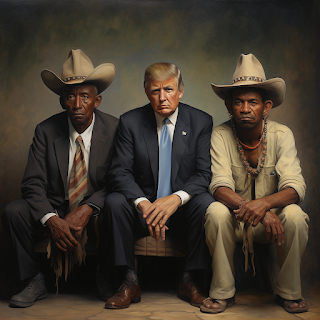Bigotry, a stain on human interaction, resonates profoundly in the dynamics of American society and politics. This essay embarks on a comprehensive exploration of the intricate connection between bigotry and the political landscape, unraveling its far-reaching effects and implications.
**1. Bigotry: The Underlying Divide**
At the heart of the issue lies bigotry, a complex amalgamation of prejudiced beliefs and discriminatory actions. It’s not a mere difference in opinion but a corrosive force that dismantles social cohesion, perpetuates inequality, and thwarts the ideals of a harmonious society.
The historical roots of bigotry run deep, entwined with power dynamics and systemic biases. Its manifestations vary, from subtle microaggressions to overt acts of discrimination. By acknowledging the harmful impact of bigotry, we dismantle the notion that it's merely a matter of perspective—a notion that trivializes the tangible harm it inflicts.
**2. America's Battle with Bigotry: A Persistent Challenge**
To ignore the existence of bigotry within American society is to deny a somber reality. This nation, built on principles of freedom and equality, has struggled against the currents of systemic prejudice for centuries. It's a challenge rooted in historical inequalities that permeate modern life.
The pervasive nature of bigotry is not confined to isolated incidents—it festers within institutional frameworks, influencing policy decisions, economic opportunities, and social interactions. It seeps into educational systems, shaping perceptions from a young age, and perpetuates the cycle of inequality.
In recent years, movements like Black Lives Matter have spotlighted the systemic racism that perpetuates bigotry. These movements catalyze conversations around privilege, inequality, and the critical need for change. However, they also elicit resistance, revealing the deeply entrenched nature of bigotry within segments of the population.
By acknowledging bigotry as a reality, we don't merely point fingers but engage in a collective call to address the issue head-on. Ignoring it allows the problem to persist, sowing seeds of division and stifling societal progress.
**3. The Obama Era: A Shift in Expression**
During the presidency of Barack Obama, a discernible shift occurred in the expression of bigotry. This era witnessed a transformation where overt manifestations of prejudice seemed to take a backseat. It's important to note that this shift did not signal bigotry's eradication; rather, it indicated a recalibration of its visibility.
The factors driving this change are multifaceted, intertwining political rhetoric, evolving societal norms, and the influence of media. While overt expressions waned, latent biases persisted, revealing that the transformation was more about form than substance. This shift underscores the dynamic nature of bigotry, adapting to societal currents while still maintaining its underlying influence.
**4. A Matter of Fact: Trump’s Demonstrable Bigotry**
The annals of American politics are marred with instances that validate the presence of bigotry. Donald Trump's tenure as President brought this issue to the forefront, marked by divisive rhetoric and policy decisions that resonated with prejudiced ideologies. The travel ban targeting Muslim-majority countries, his comments on immigrants, and his responses to racially sensitive incidents all underscored a stark disregard for inclusivity and empathy.
By examining these actions within the context of bigotry, we transcend political affiliations and delve into a factual analysis. The impact of a leader’s attitudes and decisions reverberates through society, shaping public opinion and influencing policy directions.
**5. Amplifying Voices: The Crescendo of Bigotry**
In recent years, the volume of American bigotry has surged, echoing through social discourse and political narratives. This amplified voice poses a grave threat to the fabric of societal harmony. Hate speech, discriminatory actions, and exclusionary policies amplify divisions, eroding the foundations of unity and shared values.
This escalation is not isolated; it's entwined with broader shifts in societal attitudes and political climate. The rise of extremist ideologies and the normalization of divisive rhetoric fuel the flames of bigotry, perpetuating a cycle that endangers the cohesiveness of our nation.
**6. Political Entanglement: Bigotry's Influence**
The symbiotic relationship between bigotry and politics is undeniable. The intertwining of prejudiced ideologies with political narratives reveals a complex interplay that challenges the very essence of democracy. Policies targeting specific demographics, divisive campaign strategies, and discriminatory legislation demonstrate the entanglement of bigotry with the corridors of power.
As societal divisions are exploited for political gain, the consequences are far-reaching. Democracy thrives when diverse perspectives are valued, but when bigotry infiltrates political discourse, it distorts public opinion, undermines trust in institutions, and hinders progress.
**A Call for Action: Charting the Way Forward**
To confront bigotry’s resurgence demands collective effort. Proposals emerge as potential pathways, grounded in addressing systemic inequalities and nurturing inclusivity. Accessible education for all citizens serves as a cornerstone, dismantling barriers that perpetuate prejudice and fostering understanding. Elevating marginalized voices to positions of influence injects diverse perspectives into decision-making, eroding the foundations of bigotry.
Ultimately, it is through dialogue, empathy, and education that we traverse the path toward eradicating bigotry. By embracing these actions, we ensure a future where unity and equality are not just aspirational ideals, but lived realities.
To this end: Make four years of college free to every American, increase the number of authoritative rolls, such as politicians and policemen, filled by Americans that are not caucasian, instil and enact other systems that grow away from intentionalities of fear, competition and control to work toward intentionalities of love, cooperation and creation.

No comments:
Post a Comment
Thanks for commenting.